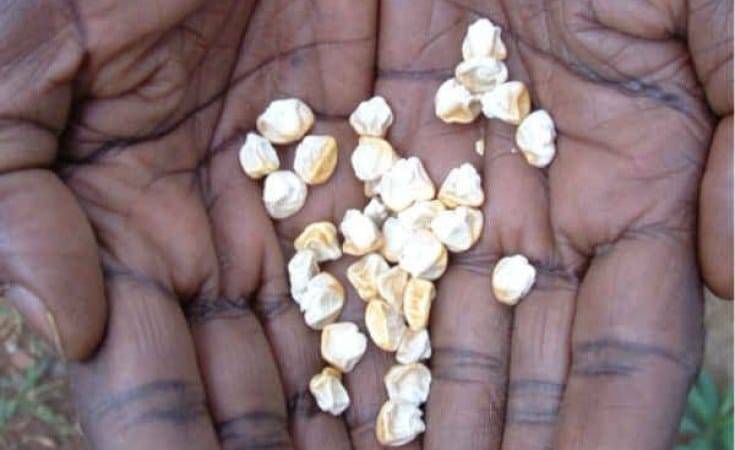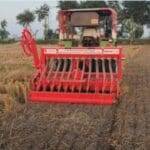Main Points In Hindi (मुख्य बातें – हिंदी में)
-
आत्मनिर्भरता की दिशा: अफ्रीकी कृषि प्रौद्योगिकी फाउंडेशन (AATF) का मानना है कि जल-कुशल मक्का (WEMA) TELA को अपनाने से नाइजीरिया 2028 तक मक्का उत्पादन में आत्मनिर्भर हो जाएगा।
-
प्रौद्योगिकी के लाभ: TELA मक्का सूखा और कीट-प्रतिरोधी है, जो मनुष्यों और पशुधन के लिए भी सुरक्षित है। इसका उत्पादन किसानों को कीटनाशक के स्प्रे की आवश्यकता को कम करता है।
-
बीज उत्पादन की चुनौती: वर्तमान में नाइजीरिया में पर्याप्त बीज की कमी है, लेकिन AATF ने 2025 में बीज उत्पादन के लिए 150 हेक्टेयर भूमि खोली है, और अगले तीन से चार वर्षों में उत्पादन बढ़ाने का लक्ष्य है।
-
भविष्य की योजना: AATF इस साल 51 टन TELA मक्का लाने के बाद अगले वर्ष 400 टन और फिर दो वर्षों में 1,200 टन उत्पादन करने की योजना बना रहा है।
- सरकारी और सामुदायिक समर्थन: श्री ओइके ने सरकारी समर्थन पर जोर दिया है और अधिक किसानों को इस प्रौद्योगिकी के अपनाने के लिए प्रोत्साहित किया है, ताकि सूखा और कीट की समस्याओं का समाधान किया जा सके।
Main Points In English(मुख्य बातें – अंग्रेज़ी में)
Here are the main points from the provided text regarding the African Agricultural Technology Foundation’s (AATF) advocacy for the adoption of Water Efficient Maize (WEMA) TELA maize in Nigeria:
-
Self-Sufficiency by 2028: AATF believes that the adoption of WEMA TELA maize by farmers across Nigeria can lead the country to achieve self-sufficiency in maize production by the year 2028.
-
Benefits of TELA Maize: TELA maize is drought and pest-resistant and is considered safe for both humans and livestock, making it a viable option for Nigerian farmers facing climatic and pest challenges.
-
Current Seed Production Challenges: AATF highlights insufficient seed availability as the biggest challenge facing the current agricultural landscape in Nigeria. They are working on expanding seed production and aim to produce around 11,000 tons of TELA maize by 2028.
-
Training and Support Required: The adoption of this new technology necessitates training for farmers to ensure effective utilization, and the AATF is calling for support from the government and other stakeholders.
- Projected Seed Production Increases: The organization plans to significantly increase seed production from 51 tons this year to 1,200 tons in two years, and aims to meet local demand for maize production through increased domestic output, thereby reducing imports.


Complete News In Hindi(पूरी खबर – हिंदी में)
अफ्रीकी कृषि प्रौद्योगिकी फाउंडेशन (एएटीएफ) का कहना है कि देश भर के किसानों द्वारा अफ्रीका के लिए जल-कुशल मक्का (WEMA) TELA मक्का को अपनाने से नाइजीरिया 2028 तक मक्का उत्पादन में आत्मनिर्भर हो जाएगा।
एएटीएफ के लिए WEMA TELA मक्का परियोजना प्रबंधक, श्री सिल्वेस्टर ओइके ने, TELA मक्का गवर्निंग काउंसिल द्वारा अबूजा में राष्ट्रीय कृषि जैव प्रौद्योगिकी अनुसंधान विकास एजेंसी (NABRDA) के TELA मक्का डेमो फार्म के निरीक्षण दौरे के मौके पर यह बात कही।
उन्होंने नाइजीरियाई लोगों से टीईएलए मक्का प्रौद्योगिकी को अपनाने का आग्रह किया क्योंकि यह सूखा और कीट-प्रतिरोधी होने के साथ-साथ मनुष्यों और पशुधन के लिए भी सुरक्षित है।
श्री ओइके ने कहा कि उत्पाद की विविधता में सूखा, स्टेमबोरर और फॉल आर्मी-वर्म के खिलाफ ट्रिपल सुरक्षा है।
उनके मुताबिक उत्पाद अपनाने से किसानों को स्प्रे करने की जरूरत नहीं पड़ेगी.
परियोजना प्रबंधक ने कहा कि प्रौद्योगिकी कायम हो गई है, और कहा कि जरूरत एक बीज प्रणाली विकसित करने की है जो अधिक किसानों को बीज तक पहुंच प्रदान करेगी।
हालाँकि, उन्होंने अपर्याप्त बीज को वर्तमान में देश के सामने सबसे बड़ी चुनौती के रूप में पहचाना।
श्री ओइके ने कहा कि संगठन ने फिलहाल, 2025 के मुकाबले बीज उत्पादन के लिए 150 हेक्टेयर भूमि खोली है।
उन्होंने कहा कि इशारे के बावजूद मांग अधिक होने के कारण बीज पर्याप्त नहीं होगा.
ओइके ने कहा कि अगले तीन से चार वर्षों में, किसानों को देश में उत्पाद की बीज मांग को पूरा करने के लिए स्थानीय स्तर पर पर्याप्त भोजन का उत्पादन करने में सक्षम होना चाहिए।
“हम इस साल 51 टन TELA मक्का लाए हैं जिसे किसान ज्यादातर प्रचार के लिए उगा रहे हैं; अगले साल हम 400 टन होने की उम्मीद कर रहे हैं।
“दो वर्षों में, हम 1,200 टन तक उत्पादन करने की योजना बना रहे हैं; इसलिए, 2028 तक हमारे पास नाइजीरिया में 11,000 टन TELA मक्का की उपज होनी चाहिए
“यह एक नई तकनीक है जिसके लिए लोगों के प्रशिक्षण की आवश्यकता है; और धीरे-धीरे, जैसे-जैसे उनका उत्पादन बढ़ रहा है, आप स्थानीय मांग पूरी होने तक आयात कम कर देते हैं।
”जो भी सरकार इस तकनीक को अपनाती है, उसके पास खाद्य सुरक्षा समस्या के समाधान के लिए आनुवंशिक रूप से संशोधित तकनीक का उपयोग करने की अच्छी राजनीतिक इच्छाशक्ति होनी चाहिए।”
श्री ओइके ने उत्पाद को अपनाने के लिए सरकार की सराहना की और अधिक किसानों को सूखे और कीड़ों की समस्या से निपटने के लिए प्रौद्योगिकी अपनाने में सक्षम बनाने के लिए सभी के समर्थन का आह्वान किया।
उन्होंने कहा कि TELA मक्का फार्म का दौरा जानबूझकर बीज प्रणाली टीम के साथ क्षेत्र पर परियोजना का मूल्यांकन करने के लिए किया गया था।
“मूल्यांकन उन्हें किसानों के खेतों पर किस्मों के प्रदर्शन और उनकी चिंताओं को देखने की अनुमति देने के लिए है ताकि जब वे प्रजनन कार्यक्रम में वापस जाएं, तो वे प्राप्त प्रतिक्रिया के आधार पर नस्ल में सुधार कर सकें।
उन्होंने आगे कहा, “इससे टीम को यह भी पता चलता है कि किसान क्या महसूस करते हैं और कितने बीज की आवश्यकता है ताकि टीम उन बीजों को तैयार करना शुरू कर सके जो वह अगले साल किसानों के लिए लाएगी।”


Complete News In English(पूरी खबर – अंग्रेज़ी में)
The African Agricultural Technology Foundation (AATF) has stated that the adoption of Water Efficient Maize for Africa (WEMA) TELA maize by farmers across Nigeria could lead the country to become self-sufficient in maize production by 2028.
During an inspection tour of a TELA maize demo farm organized by the TELA Maize Governing Council in Abuja, Mr. Sylvester Oike, the project manager for WEMA TELA maize at AATF, made this announcement.
Mr. Oike encouraged Nigerians to adopt TELA maize technology, highlighting its drought and pest resistance along with its safety for humans and livestock.
He mentioned that the product offers triple protection against drought, stem borers, and fall armyworms, which means farmers wouldn’t need to spray pesticides.
The project manager emphasized that while the technology is established, there is a need to develop a seed system to give more farmers access to seeds. However, he identified insufficient seed supply as the biggest challenge currently facing the country.
Mr. Oike shared that the organization has opened up 150 hectares of land for seed production compared to 2025. Despite this initiative, demand remains high, and they anticipate that there will still not be enough seeds.
He believes that in the next three to four years, farmers should be able to produce enough food locally to meet the seed demand in the country.
“This year, we have brought in 51 tons of TELA maize mostly for promotional purposes; next year we expect to have 400 tons. In two years, we plan to produce up to 1,200 tons; therefore, by 2028, we should have around 11,000 tons of TELA maize yield in Nigeria,” he stated.
He added that this is a new technology that requires training for people, and as production increases, the goal is to reduce imports until local demand is met.
Mr. Oike noted that any government adopting this technology needs to have the political will to use genetically modified technology as a solution for food security issues.
He appreciated the government’s support in adopting the product and called for broader support to help more farmers tackle drought and pest issues using this technology.
He also mentioned that the farm visit was purposefully carried out with the seed system team to assess the project in the field.
“The evaluation allows them to observe the performance of varieties in farmers’ fields and address any concerns so that when they return to the breeding program, they can improve the breeds based on the feedback received,” he explained.
He further stated, “This will also help the team understand what farmers need and how much seed is required so they can start preparing those seeds for next year.”
Source link




